Drew Wilson’s ‘Robert Millar Appreciation Group’ has generated a lot of interest on FaceBook, with 1,185 members – by now everyone must know he was Britain’s greatest stage race rider until Team Sky and their marginal gains came along – we had another name for that ‘back in the day’, but I digress…
Fourth in the Tour de France, second in the Giro d’Italia and twice second in the Vuelta; king of the mountains in the first two and a stage winner in all three.
Fabulous palmarès by any measure but there was much more to the man that with brilliant Worlds rides, excellent rides in the Classics and semi-Classics not to mention podiums, stage and overall wins in most of Europe’s great stage races outside of the ‘big three.’
Here at VeloVeritas we thought we’d take a wander through his career and remind our readers – and ourselves – of what a superb rider he really was.
It was 1976 when he first appeared on the palmarès radars as Scottish Junior Road Race Champion; within a year he was winning the Davie Bell Memorial over the Ayrshire Hills, the classic Tour of the Campsies TT and the Scottish Hill Climb Championship.
In 1978 he’d moved in to a different league with wins in the Drummond Trophy, Tour of the Peak and British Road Race Championship and was second in the season long ‘Star Trophy’ – predecessor to the ‘Premier Calendar’ and a much harder fought competition than it is now.
He also smashed the course record in the Tour of the Trossachs time trial.

It was apparent that he had too much talent to waste it on this side of the Channel and for 1979 he was based in France with the Parisian ACBB team – with wins in French amateur Classics like Paris-Evreux, GP de Lillers, GP de Grasse; there was a major stage race result with his win in the Route de France ahead of men like Regis Clere and Phil Anderson; and there was even a prestigious time trial win in the Chrono Madeilinois with the icing on the cake his fourth spot in the World Amateur Road Race Championships in Valkenburg – and but for a pulled foot in the finale he’d have been on the podium.
In between all of that he came home to defend his British Amateur Road race title, asking race commissar, the late Gerry McDaid, as he handed him a neatly folded tricot, if he could be presented with this jersey at the finish as it was a nice fit…
As would be expected for an ACBB rider, he joined the Peugeot professional team for 1980 with second in the Tour of the Vaucluse behind classy team mate Michel Laurent, his best result on paper for the year.
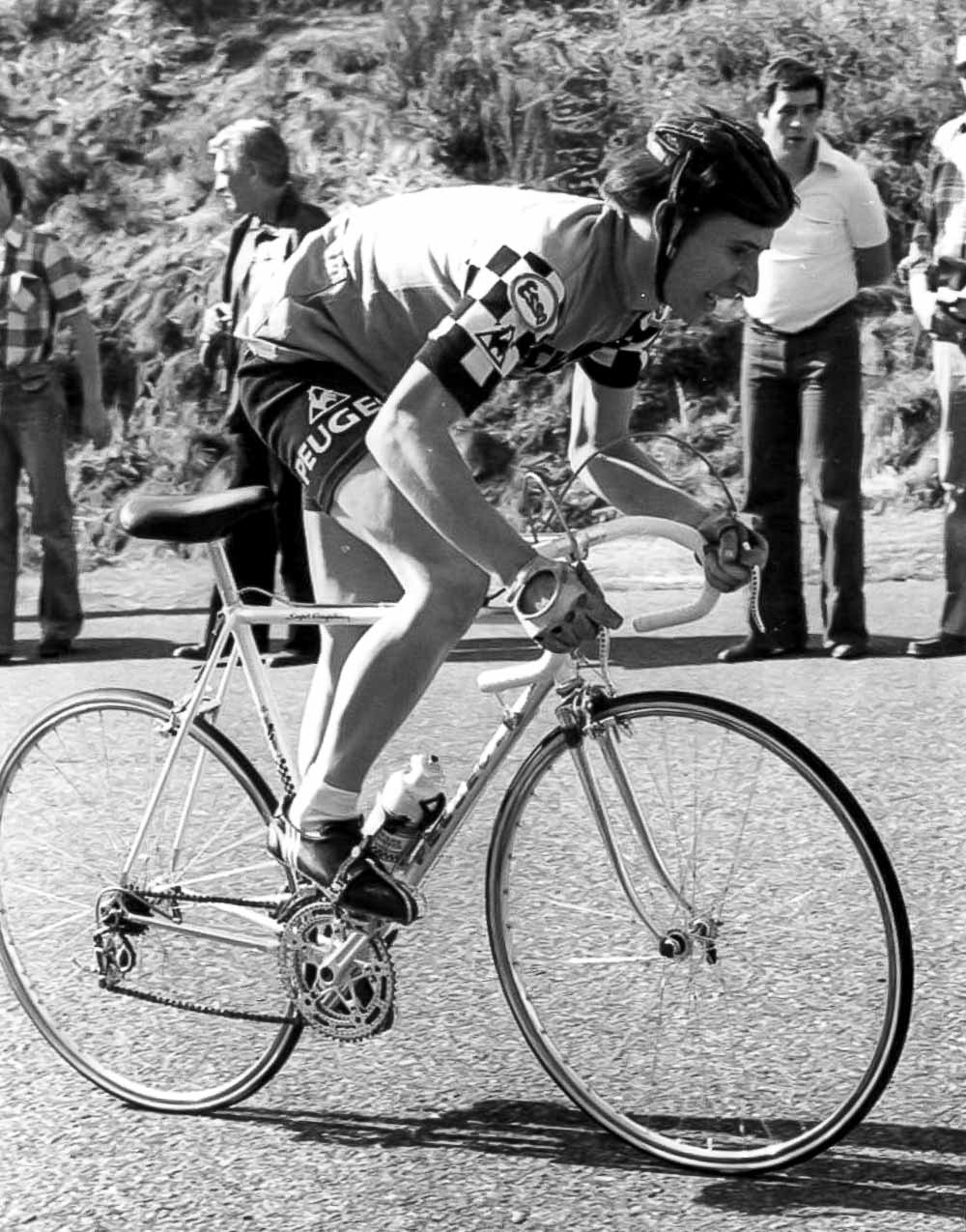
Even for a man as talented as Millar it’s a big step up from the amateur ranks to race among the professionals – but he confounded conventional wisdom with a brilliant ride in the 1980 Worlds at Sallanches, a seven-and-a-half hour epic where Bernard Hinault destroyed the field – 107 starters, 15 finishers – with Millar the second last man to succumb to the Breton on the savage climb, taking 11th place among the very best riders in the world.
We could see that he really was ‘special.’
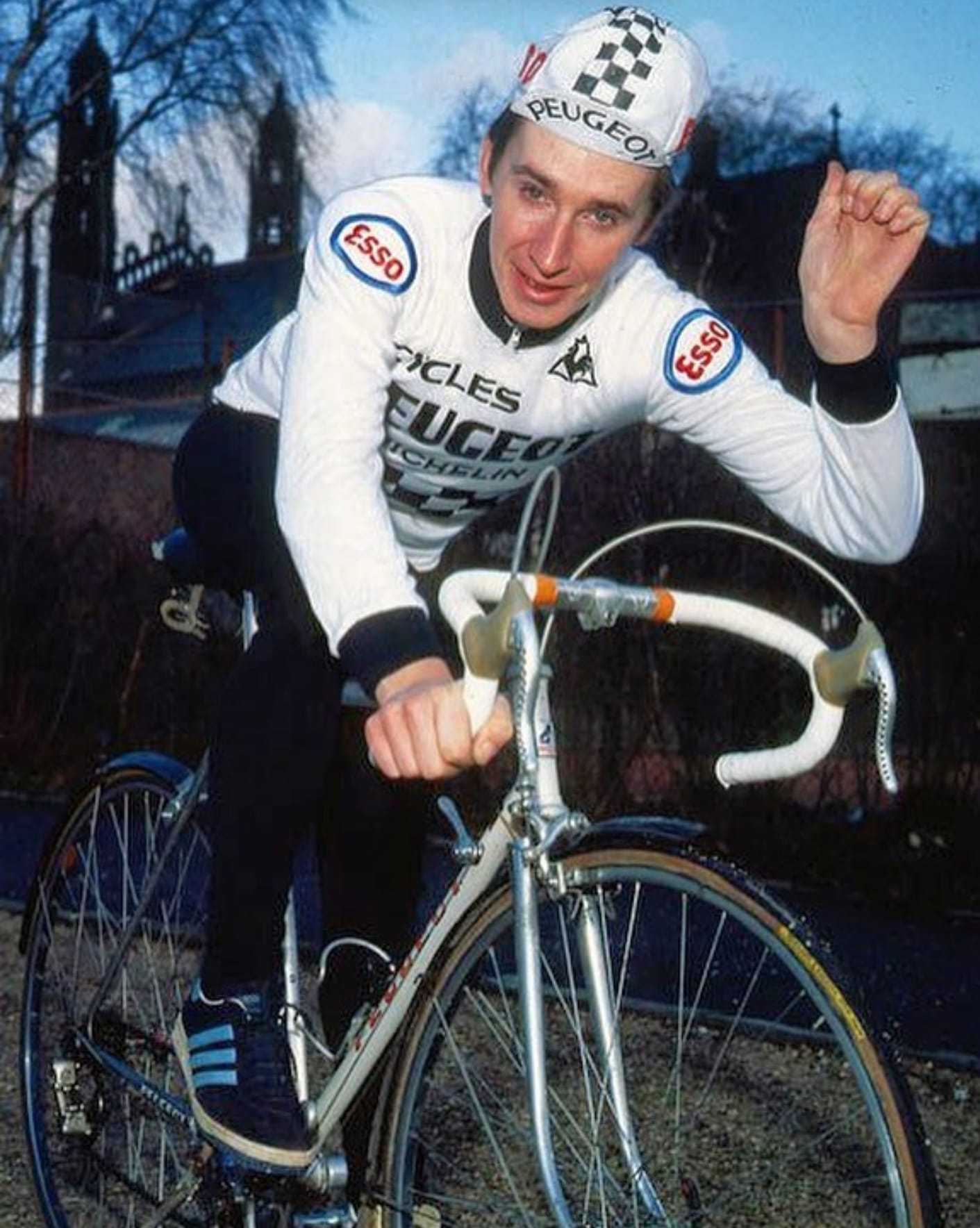
The 1981 saw top 10 finishes in the Tour de L’Aude, Tour of Romandie and Dauphine Libere with 1982 seeing him second in the Tour de L’Avenir behind the phenomenon which was a young Greg Lemond.
Second place in the 1983 Dauphine got him his Tour ride and he continued to climb the ladder to the stars with a stage win and a top 20 finish.
The early signs were good for 1984 with a spell in white at Paris-Nice as well as stages in the Midi Libere and Romandie before he produced a stunning ride in the Tour de France with a stage win, a win in the king of the mountains competition and fourth on final GC.
We believed he could win a Grand Tour – and his sixth place in the Worlds on Montjuich in Barcelona added further credence to that idea.
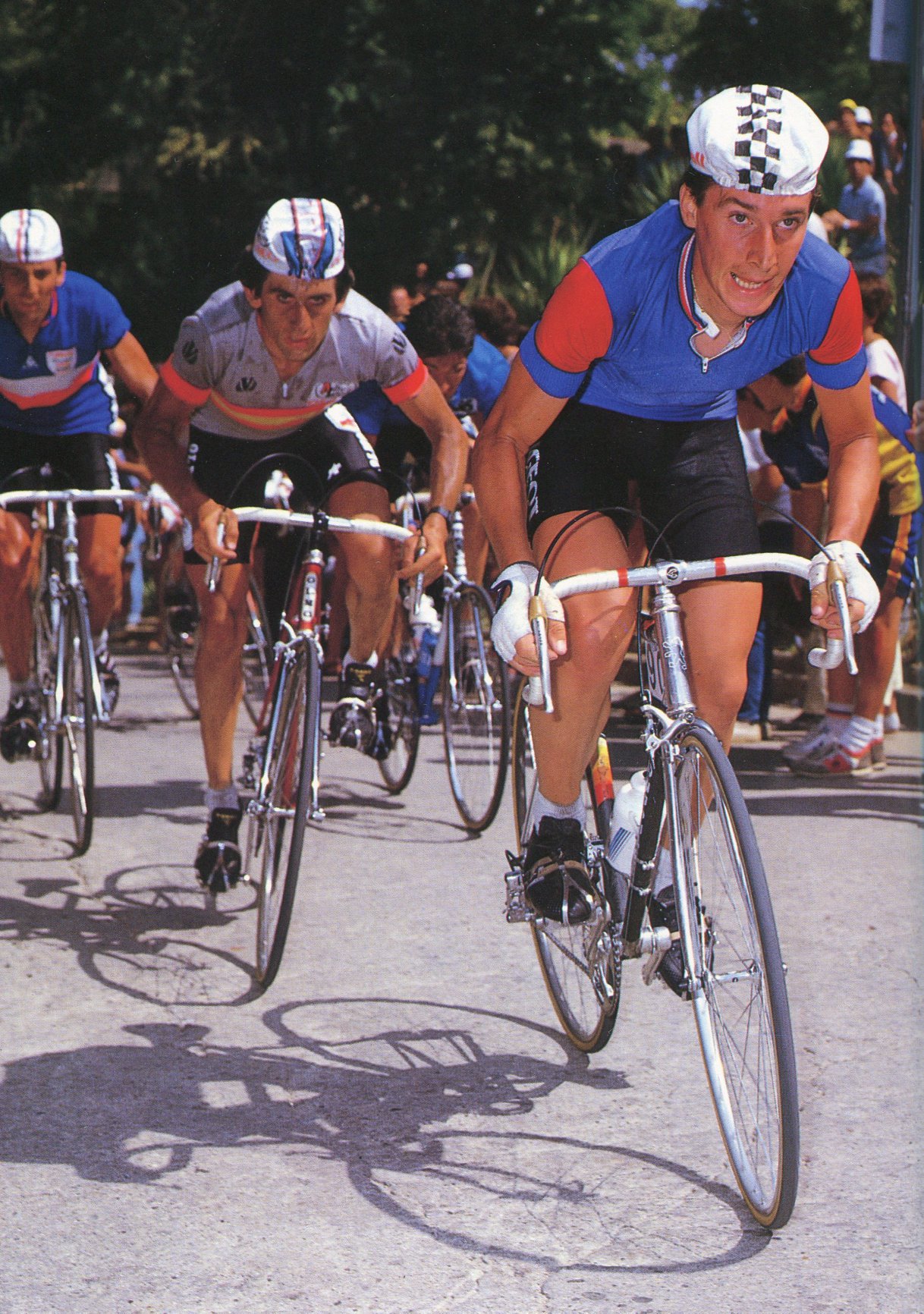
The following season, 1985 is dominated by events in the Vuelta a Espana but that overshadows a win in the Tour of Catalonia and top 10 finishes in Paris-Nice and Dauphine as well as another top 10 in the Worlds.
Yes, that Vuelta rather than my pontifications let’s say what the protagonists said.
Millar looked to be heading for overall victory but on the penultimate stage punctured; Pedro Delgado (Reynolds & Spain) – who was in sixth spot some six minutes down on GC – slipped away (unknowns to Millar until way too late in the day) with compatriot Jose Recio (Kelme & Spain) and took enough time out of the Scot to snatch the lead.
Unsurprisingly Millar was devastated;
“I’ll never return to Spain.
“Every Spanish team rode against me.”
Delgado was honest in his assessment;
“I didn’t win this Vuelta, the Peugeot team lost it.”
Sean Kelly finished ninth that year, winning three stages along the way, his comments are pragmatic and whilst he felt Delgado was an unworthy winner he observed that Peugeot should have been on their guard for an ambush from the insular world of the Spanish pro class.
Kelly also noted that the race was getting more TV coverage than ever and that the camera motos gave unfair advantage to any break which contained Spaniards;
‘”On the second last stage when Delgado and Recio had a lead of 1:40 on the group I was in with 50 kilometres to go I felt sure we could recapture them.
“My teammates Caritoux and Garde were in the group with me and chasing very hard, all the time believing that a stage win was possible.
“But what happened?
“The two leaders almost doubled their advantage.
“That for us was impossible to understand.”
That there were combines and Machiavellian alliances in play there’s no doubt but most of the blame must lay with Peugeot DS Roland Berland who had snatched defeat from the jaws of victory.
As for team support, I was going through the stage placings for the race and in the stage 17 time trial where Millar successfully defended the jersey with a fine third place ride despite a puncture, in fifth spot was his French team mate Gilbert Duclos-Lasalle; with no GC aspirations whatsoever what the hell was he doing riding full gas in a TT with his team mate’s amarillo jersey to defend on a crucial mountain stage the next day?
Unsurprisingly, Millar jumped ship on Peugeot over the winter and joined Peter Post’s mighty Panasonic legion; with 1986 seeing him take the legendary Lagos de Covadonga stage and second overall in the Vuelta behind Alvaro Pino and second overall in the Tour of Switzerland behind Andy Hampsten – with Greg Lemond in third place.
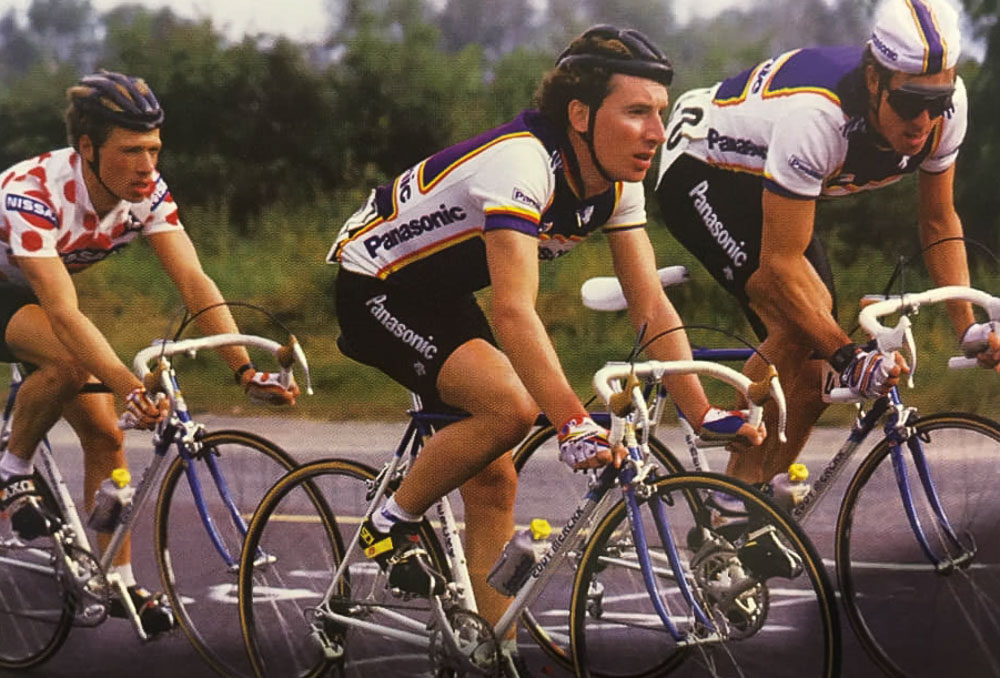
The 1987 season saw him win a stage in the Tour of the Mediterranean before a brilliant Giro where he won a stage, took second overall, was king of the mountains and helped chaperone Stephen Roche to overall victory.
But in that success were sown the seeds of his teaming up with Roche at the beautifully presented but chaotic Fagor team for 1988.
There was management polemica from day one with Roche’s knee problems meaning he hardly turned a pedal in anger and the team universally viewed by the riders as a shambles.
Despite that, Millar took top 10 finishes in the Criterium International, Route Du Sud, Vuelta, Tour of Catalonia, Tour of the Basque Country and Paris-Nice – not to mention a podium in Liege-Bastogne-Liege.
It was also the year he was denied an almost certain stage win from a small breakaway in the Tour when mis-directed by a gendarme in the closing metres.
‘Z’ was the comic book inspired motif on the Millar chest for 1989, advertising children’s clothes instead on Fagor’s ‘white goods.’
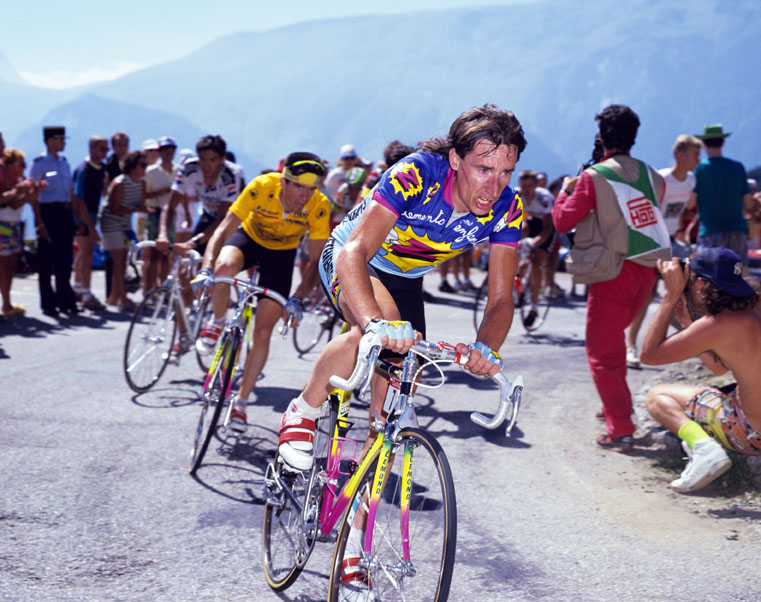
The wins came back with stages in Romandie, the Dauphine and his third Tour stage – as well as the GC in the Tour of Britain.
The following season, 1990 was a strong one too with a stage win in Romandie, second places on GC in the Tours of Britain and Switzerland and a brilliant overall win in the Dauphine.
There was also his selfless riding for team mate Ronan Pensec on L’Alpe d’Huez to save the Frenchman’s maillot jaune.
He ended the season just one place off the podium in the Tour of Lombardy.
The 1991 season saw him win a stage in the Tour of Switzerland finish second in the Romandie and in the now defunct but savage Classique des Alpes.

For 1992 he left Z and headed for the flat lands, joining Cees Priem’s Dutch TVM squad, an insurance company who specialised in insuring transport companies.
Top 10 finishes came in the Giro del Lazio, Giro delle Piemonte, Liege-Bastogne-Liege, Catalan Week and Tour of Britain.
There were more top 10 placings in 1993 – the Midi Libere, Tour of the Mining Valleys in Asturias and in the Classique des Alpes.
In his final year with TVM he took top 10 finishes in the Italian semi classics the Coppa Placci and Coppa Sabatini and in the Tour of Galicia.
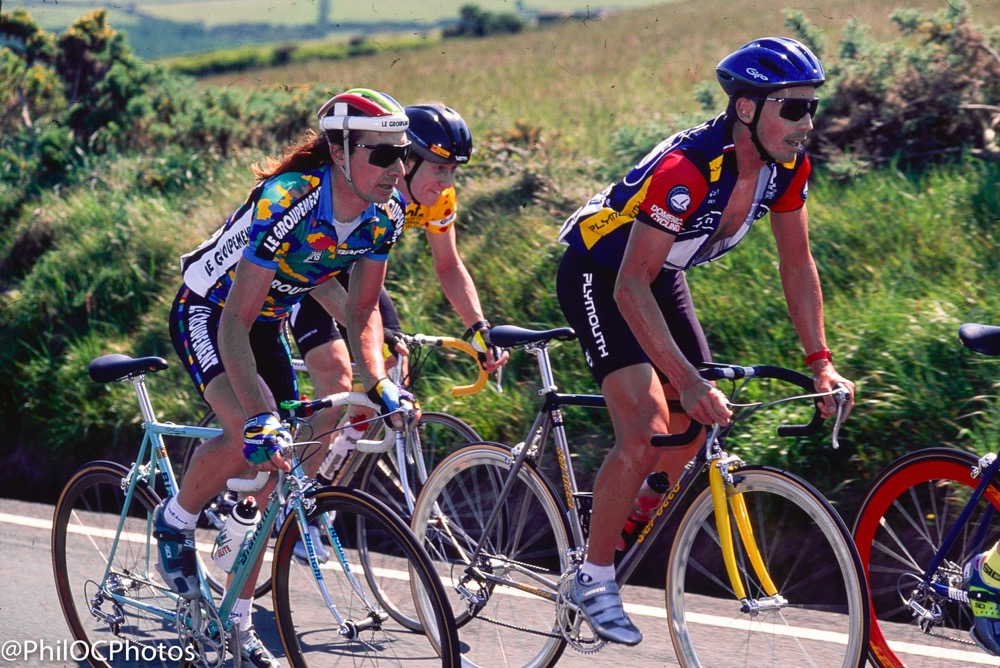
The ill-fated Le Groupement team – whose jersey was voted among the top 10 worst ever by Cycling Weekly magazine – was his last pro squad in 1995; he won the British Road race Championship for them on the Isle Of Man but the squad folded thereafter amid a ‘pyramid selling’ scandal.
He was 16 years a pro, left his mark on all of the world’s greatest stage races, won stages in every notable stage race in Europe, performed with great distinction in several world championships and all at a time well before ‘mondialisation’ where a foreign rider on a French team was always ‘up against it.’
As Dave Duffield might have said; ‘Chapeau, Monsieur Millar!’



